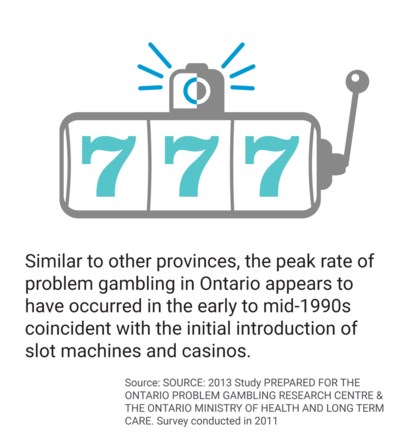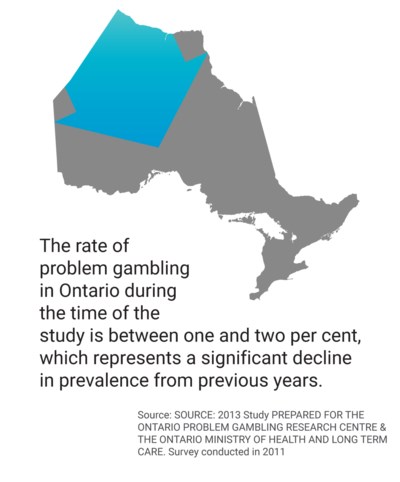Greater Sudbury has been told many things about casino gambling in the past few years — from a casino will be an economic drain and a driver of social ills to a casino will be a big boon for tourism and a new source of jobs and revenue.
So, what are taxpayers to believe? Opponents and proponents have offered either doomsday scenarios or gold-at-the-end-of-the-rainbow visions of what expanded casino gambling in the city will mean.
Sudbury.com wanted to know, too. So we tracked down the best academics we could find who specialize in casinos and their impacts. Below you'll find summarized what the experts in the field have to say about casinos, gambling and what they mean for communities.
How did we get here?
As the gaming industry exploded in the last four decades in North America, experts have struggled to come up with a reliable method to evaluate the impacts casinos have on the communities where they set up shop.
The challenges include the variables in each community and how quickly the marketplace is changing. In the 1970s and 1980s, when North American casinos were largely restricted to Las Vegas, the majority of customers had to travel there. That translated into an inflow of revenue that was easy to measure and bound to have a positive impact on the local economy.
Similarly, when First Nations began opening destination casinos in the 1980s and 1990s, they were literally the only gaming option for miles and miles around, and local communities benefited.
Today, not only are casinos common in most every province and U.S. state, there are also a wide range of online gambling options. Forty years ago, you had to travel. Today, you can gamble from home.
So in the modern gaming environment, gauging the impacts of casinos has become more complicated. And as is the case with anything traditionally defined as a “vice,” how do you properly estimate the cost of social misery – the divorces, bankruptcies and even suicides of problem gamblers the math tells us will happen?
 Caption
Caption
Difficulties aside, with hundreds of studies conducted in recent years, economists and sociologists have noticed patterns emerging that offer insight into what sort of conditions communities can expect from casino gaming.
In an attempt to avoid bias on either side of the ledger, we didn't speak with academics who work for the gaming industry, and focused instead on people whose work wasn't based on finding either a positive or negative conclusion, but to provide the best information.
The patterns these studies found can be summed up with some basic generalities. Again, these are generalities and individual communities will experience individual effects. Still, the patterns are instructive because they provide the best picture we have about what happens when a casino comes to town.
In general, casinos that attract out-of-town customers have the biggest economic benefit for the host communities. Otherwise, the impacts – negative and positive – are statistically small and dissipate quickly in the years after the casino opens.
The primary benefit is the new jobs being created, particularly when they are unionized jobs that pay well and offer benefits. Casinos can be an effective part of an urban renewal efforts in cities, bringing in private money alongside public dollars, but are unlikely to generate new economic activity on their own. The primary drawbacks are the social costs of gambling addiction and the fact charity bingos see a considerable drop in revenue.
Dr. Brad Humphreys, West Virginia University
Dr. Brad Humphreys is an American academic who earned his doctorate in economics at Johns Hopkins University. He has testified twice before the U.S. Congress on the relationship between professional sports teams and facilities.
While working at the University of Alberta, Humphreys was one of three academics who wrote a 2016 study called, “Do urban casinos affect nearby neighbourhoods? Evidence from Canada.”
Using data from casinos opened in Canada between 1986-2007, the study looked at the impact of the opening of 47 casinos in that period in 29 communities.
"I think that paper is a pretty good indicator of what economists know about this,” Humphreys said. "It looks to us like a new casino opening doesn't really do much, except it may reduce property values really close to the casino, but that doesn't last very long after it opens up.
“It does look like there's some positive tangible economic impacts, because most of the casino jobs pay pretty well."
Again, an ability to attract out-of-town customers is the best indicator of success, but Humphreys said there's no evidence that a casino harms other local businesses, aside from local charity gaming sites.
"The evidence in the paper I did — and that's a peer-reviewed journal and a fairly thorough study of the topic — suggests not much bad happens when you open a casino," he said. "I don't think there's a lot of research from the scholarly literature that suggests it's just going to be terribly destructive in a community.
“I'll be the first to admit that problem gambling is an issue, and it's pretty clear some people, given the opportunity to gamble, will ruin themselves and their families and that's a bad thing. But the problem gambling rate is pretty small."
People with serious gambling problems make up one per cent or less of the population, according to most studies, Humphreys said, and communities already exposed to gambling, as is the case with the Slots at Sudbury Downs, the impact on problem gambling is significantly less than communities getting a casino for the first time.
"The people who are going to ruin themselves and their families, they have access to gambling anyway,” he said. “So it's unclear whether a new casino really induces more people to have gambling problems. It probably just changes where it is they bankrupt themselves."
Humphreys, who has also done extensive research on the economics of arenas, said while there are no negatives associated with arenas, perhaps suprisingly, they don't have much of an economic impact either, wherever they are located.
“There's no evidence that arenas generate much tangible local economic benefit," he said. "There's not a shred of evidence that supports that idea. And there's a lot more evidence on the economic impact of arenas than there is on casinos.
"If you're a bar owner and you're next to an arena, you're probably going to lose some business. But overall, if the arena is still in the city, that's just moving spending around from one part of town to another.
“And this whole idea that there is going to be a multiplier that's different downtown than towards the edge of town, there's no evidence of any claim like that. The multiplier on an arena is probably zero. That's consistent with a huge body of existing evidence. There are lots of cities that have moved arenas around."
As hugely profitable businesses, Humphreys said communities should push casinos to contribute to local projects. He studied the arena development in Pittsburgh, where the city built a new rink for the Penguins.
"In Pittsburgh, they used a lot of casino revenue to help finance the construction of that arena they built for the Penguins," he said. "That might be a question to ask."
Michael Wenz, Northern Illinois University
Michael Wenz, the acting chair of economics and geography and environmental studies at Northeastern Illinois University, led research that focused on the actual impacts on communities that have a casino. Like Humphreys, Wenz found a mixed bag of impacts, all of which were moderate.
"Some of the things casino do are bad — they do seem to lead to an increase in pathological gambling," he said. "They also seem to have the possibility of creating some economic development and some jobs. My research basically settles on there are a few things that are smart for cities to do."
First, Wenz said cities should be aware that if the casino doesn't attract out-of-towners, the positive economic impact will be largely limited to the casino jobs.
"You need to figure out a way for the casino to attract people from outside the region," he said. "Casinos that serve primarily a local market will tend to recirculate money that's already there. That's the biggest thing to be careful about and the thing I think local policymakers lose sight of."
"If the Sudbury casino is primarily going to serve a local population, I would be careful. If the Sudbury casino is going to serve people who come to visit, then that's a different story. It brings dollars in and exports the harm."
He also said that a city looking for financial support for a new arena or anything else should get an agreement before the shovel hits the ground. Once a casino opens, the city loses any leverage to share in the profits.
"And the casino business is a wildly profitable business," Wenz said. "So I think it would be in the best interest of the city to try and get as much as they can up front from the casino. Once the casino opens, they are profit maximizers and they are going to extract as much as they can out of the community."
But combining the casino with a new arena with concerts, and the new downtown art gallery and convention centre, as Sudbury plans to do, increases the chance that there will be enough of an attraction to bring in people from outside the city.
"If you're serving the local population, the local population will be making a decision between the casino and the art gallery,” he said. “If you're serving a population that's coming from a distance, they might choose the casino and the art gallery. If it becomes part of creating a destination, then you can bring in outside dollars."
Alissa Mazar, McGill University
Alissa Mazar, a PhD candidate in sociology at Montreal's McGill University, released a study late last year on the history of the casino in Windsor, the first full-blown casino in Ontario when it opened in 1994. Mazar's research focused on how the casino went from a private initiative to revive that city's devastated economy to a public process where government revenues were the driving force.
When the Windsor casino opened, it was the only one for miles around. As a border city, it drew a large portion of customers from Detroit, and even as far away as Indiana and Ohio. It was one of the busiest casinos in the world and employed 5,000 unionized workers — at least until three casinos opened in the Detroit area, and other nearby states followed suit.
Today, Caesars Windsor, as the casino is now named, still has 2,500 workers and is a major employer in a city where the jobless rate dropped from 13.8 per cent in 2009 to 4.6 per cent last month.
Mazar said the complexities of the issue became apparent as she progressed with her study.
"The takeaway from my research is it's not and really a black and white issue,” she said in an interview. "It's very context specific. To say, across the board, it's always good or it's always bad, doesn't do justice to the context-specific nature of casino development."
In any context, casinos that draw more of its customers from outside the host city make a positive impact, she said. But having a lot of competition makes it more difficult to attract people.
"The question always is, where are these patrons going to come from?” Mazar said. “Is it just going to be a re-circulation of local dollars or will new money be coming into the community? (Although) there are arguments to say that just the increase in consumer options in itself increases economic growth.
"Then there are things like is it part of a larger economic development initiative, is it a one-stop shop or is it partnering with smaller businesses in the community to make it more of an integrated casino rather than a standalone? The job quality is also important — will the new jobs be in a unionized environment? That had a dramatic impact on the quality of jobs (in Windsor). They're one of the largest employers in the community."
So, overall, has the Windsor casino been positive or negative for the city?
"It's hard to sum things up that way,” Mazar said. "In the Windsor case, it's yes and no. It has undoubtedly generated revenues, but relative to the initial estimates, it might not be as much as they were originally (estimated) to be."
Siew Hoon Lim and Lei Zhang, North Dakota State University
In their 2017 research paper, “Does Casino Development Have a Positive Effect on Economic Growth?,” North Dakota State University academics Siew Hoon Lim and Lei Zhang looked at data from 48 U.S. states from 2003 to 2012 to get an idea of the effect of casinos on income growth and job creation.
They looked at the impact three years after a casino opened, and again 10 years later. What they found, similar to other studies, is the effects tend to be moderate.
“Our results show that casinos had a positive effect on per capita income,” their paper said. “Casino expansions exerted a small, positive effect on both per capita income growth and job growth.”
That positive effect largely dissipated after 10 years, but their study found that “that casino expansions continued to have a positive effect on the 2003–2012 job growth.”
But gambling, like other traditional vices, has a social cost, they write, one that is felt by everyone, not just those who gamble. And with the surge in casino building in North America, they found evidence of “cannibalization.” The closer together casinos are, the more profound the cannibalization effect.
 Caption
Caption
“Casino expansion can reach a saturation point,” they write. “Using a panel data set of commercial casinos in and around Illinois from 1994 and 2006, (one 2014 study) found evidence of cannibalization within the gambling industry, and this effect dissipated with the distance between rivalling casinos.”
Overall, they conclude after looking through all the studies, that casinos have a positive effect on income growth in the communities where they operate, but that positive effect is small.
“Evidence of positive economic growth was observed in counties with expansions in medium- and large-sized casinos,” they write. “We also found, however, that the effect of casinos on per capita income growth between 2003 and 2012 disappeared after controlling for spatial effects, suggesting that local or regional factors other than casinos may be the drivers of income growth in the long term.
“Finally, we did not examine the effects of casinos on bankruptcies, violent crime, auto thefts and larceny. If the economic benefits are short-term and small, but the harm to society is long-term and potentially irreversible, rather than focusing on the temporary gains, one must weigh the benefits and costs in a comprehensive, holistic manner when it comes to legalizing casinos.”
So then, what are the social & economic impacts?
A 2011 study, “The Social and Economic Impacts of Gambling,” prepared by the Canadian Consortium for Gambling Research, is a fairly exhaustive review of nearly 500 academic articles on gambling. It concludes there is no reliable way to do a cost-benefit analysis when it comes to casinos.
“There is no reliable way of doing this,” the report says. “Judging the overall positive or negative nature of gambling will always be a subjective determination about the relative importance of the observed social impacts compared to the observed economic impacts.”
One of the challenges is a lack of quality studies. The report looked at 492 studies, of which just 293 were fact-based examinations of data. Of those, just 51 were found to be of good to excellent quality.
One conclusion was consistent in the high-quality studies: “Analysis of these empirical studies shows that the most reliable impact of gambling across all forms of gambling is an increase in government revenue.”
Another reliable effect is the losses felt by local charity gambling facilities, who struggle to compete with what a full casino can offer customers.
The report also concludes, as have other studies, that casinos that attract a significant percentage of its customers from out of town have the biggest chance of boosting other local businesses.
“The introduction of gambling often has beneficial impacts on other businesses in the local area in terms of increased revenue, business starts, and overall employment when a significant portion of its patron base is from outside the area,” the study says. “However, when the patron base is from the local area it is more likely there will be negative impacts on other local businesses.
“The caveat to this general substitution effect is that there may be some potential for gambling to increase overall economic activity in its first few years of introduction without negative impacts on other industry.”
The takeaway from the research, Humphreys said, is that while casinos have moderate impacts, both positive and negative, they have increasingly become controversial. Vocal opposition to casinos has become more organized, Humphreys, from West Virginia University, said, and it's a form of “NIMBYism” by people who, for whatever reason, don't like casinos.
“And I understand that,” Humphreys said. “But the evidence doesn't come down on the side of casinos destroying communities."
